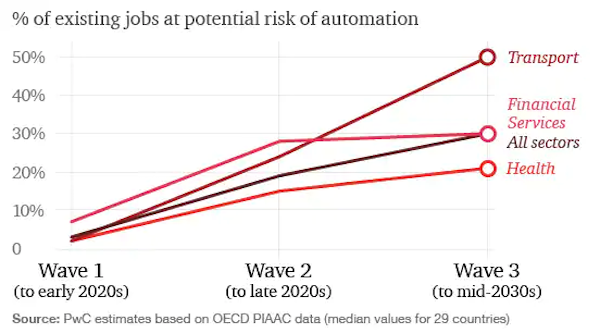It’s certainly the case that low-skilled immigrants will not be employable in the coming automated economy when robots can perform simple tasks cheaply 24/7 with no coffee breaks.
But it’s also true that higher skilled persons won’t be needed in many fields as artificial intelligence (AI) develops more capability. Immigration in general should be dialed down severely with the automated future in mind. When technology experts say 30 to 40 million American jobs are at risk of being eliminated, we should pay attention even though the employment economy is quite healthy today.
Young people planning careers and middle-aged persons considering a change should understand that some of today’s jobs may not exist in a decade or so.

But as a recent Time article notes, employment will certaInly not disappear entirely.
AI Is About to Spark a Radical Shift in White Collar Work. But There’s Still ‘Plenty of Work for People to Do’, Time magazine, January 23, 2020
The story of automation in America has long been told in shuttered factories and declining Midwestern cities. But the latest wave of advancements in artificial intelligence may be bring the prospect of machine replacement beyond blue collar work. Developers are creating algorithms that promise to take over vast amounts of work in white collar fields like law and medicine, potentially upending traditionally high-status fields. For people in those once-secure positions, the questions are whose jobs may be changed, how soon, and what new opportunities may arise to take their place.
Knowledge work that involves repetitive tasks or large amounts of data, such as lawyers’ often arduous document discovery process, is particularly ripe for disruption from AI, experts say. Tasks that require human-to-human interaction or some element of creativity are likely to be safer. “Pattern recognition in general is something that these technologies seem good at,” says Mark Muro, one of the authors of a recent Brookings Institution report that suggests high-paid, educated workers will be highly exposed to new AI technology. “That is a contribution to a lot of white collar activities.”
MIT economics professor David Autor says middle management positions are particularly susceptible to this new wave of automation, particularly in fields like finance and inventory management, where humans are in charge of translating data into concrete business decisions. But he also argues that displacement from machine learning is likely to create new opportunities.
“Historically, tons of new work comes into existence as a result of automation,” Autor says. “The whole industrial revolution came about as a result of the automation of artisanal tasks, but it would have been impossible for anyone at the dawn of that period to foresee where that would go.”
That optimism may come as cold comfort for the artisans of 2020: the millions of paralegals, human resource managers, IT professionals and other knowledge industry workers whose positions are prime targets for a new wave of automation. McKinsey predicts across-the-board cuts in such fields over the next decade. Some fields, like office financial support personnel, are likely to lose more than one in four positions.
Some economists predict even more dramatic changes in the coming years, including a radical shift in top-tier white collar work. Richard Baldwin of the Graduate Institute in Geneva argues that AI, coupled with outsourcing enabled by new advances in telecommunications, will sharply reduce white collar employment. He believes those twin drivers could displace professionals in elite sectors from media and finance to architecture and law, at least until people find new ways to put themselves to work.
“What we have is displacement being driven at the pace of digital technology, but job creation being driven at the pace of human ingenuity,” Baldwin says. “What I’m worried about is that job displacement driven by digital will outstrip job creation driven by ingenuity.” (Continues)













